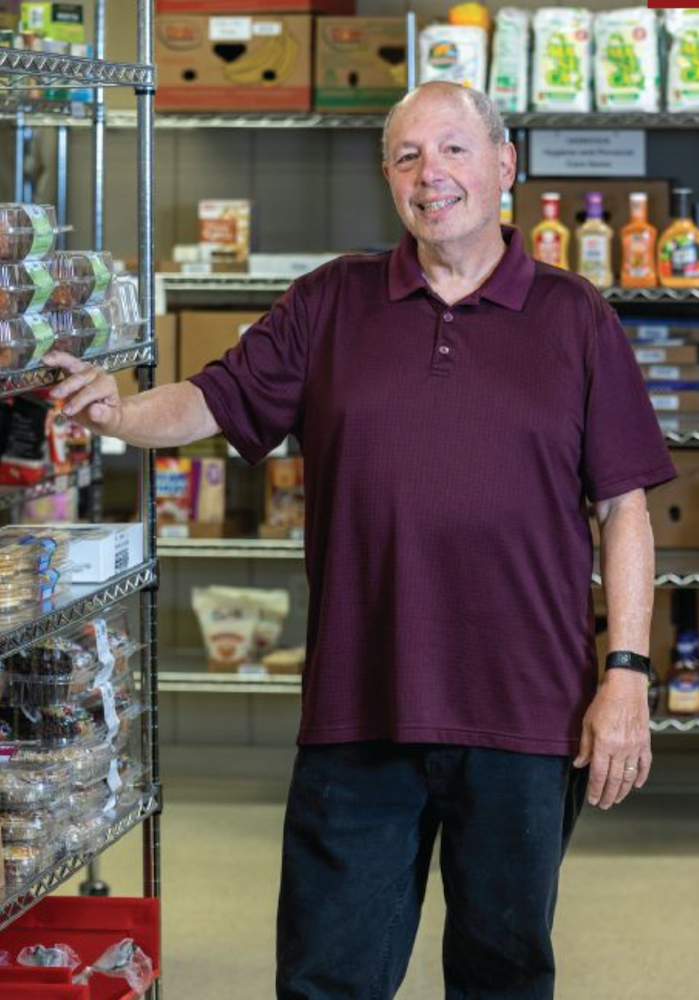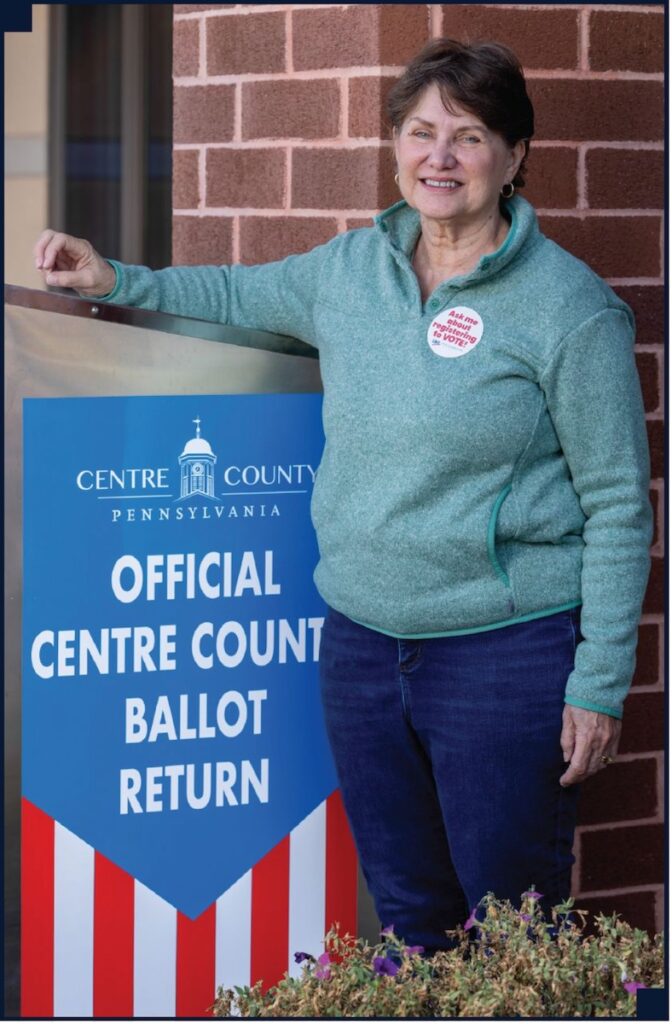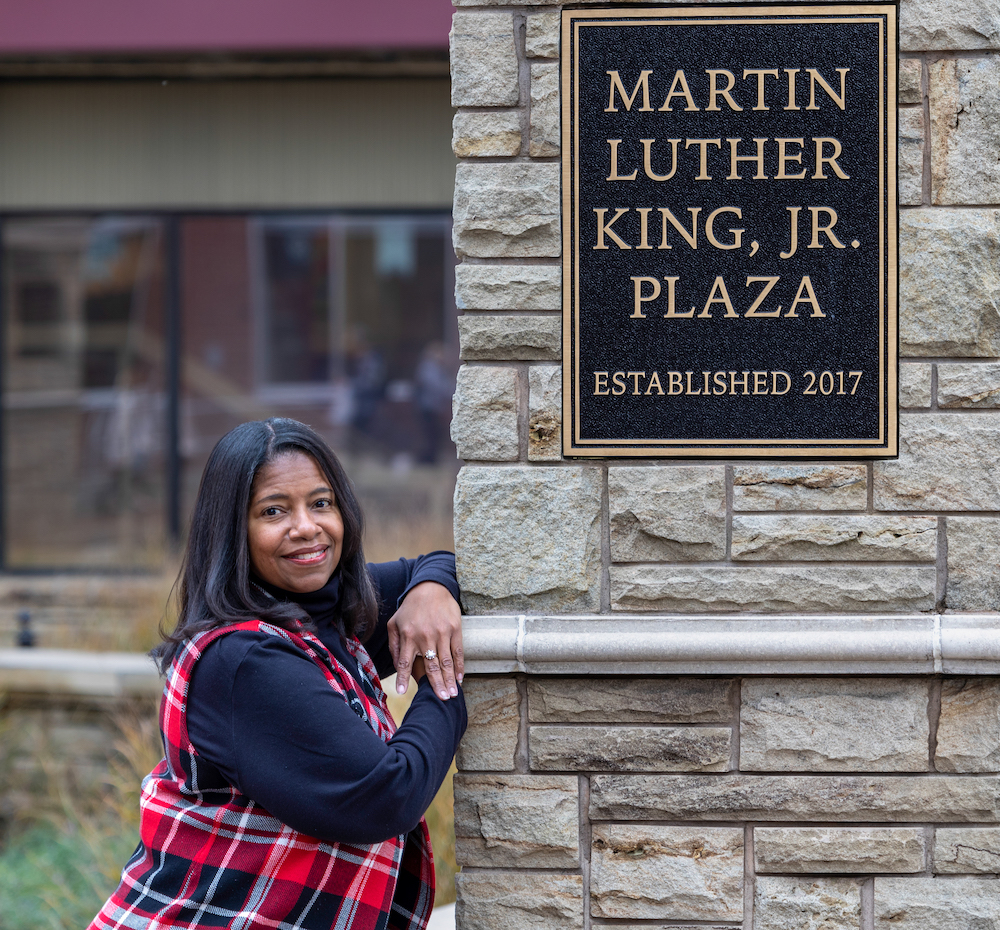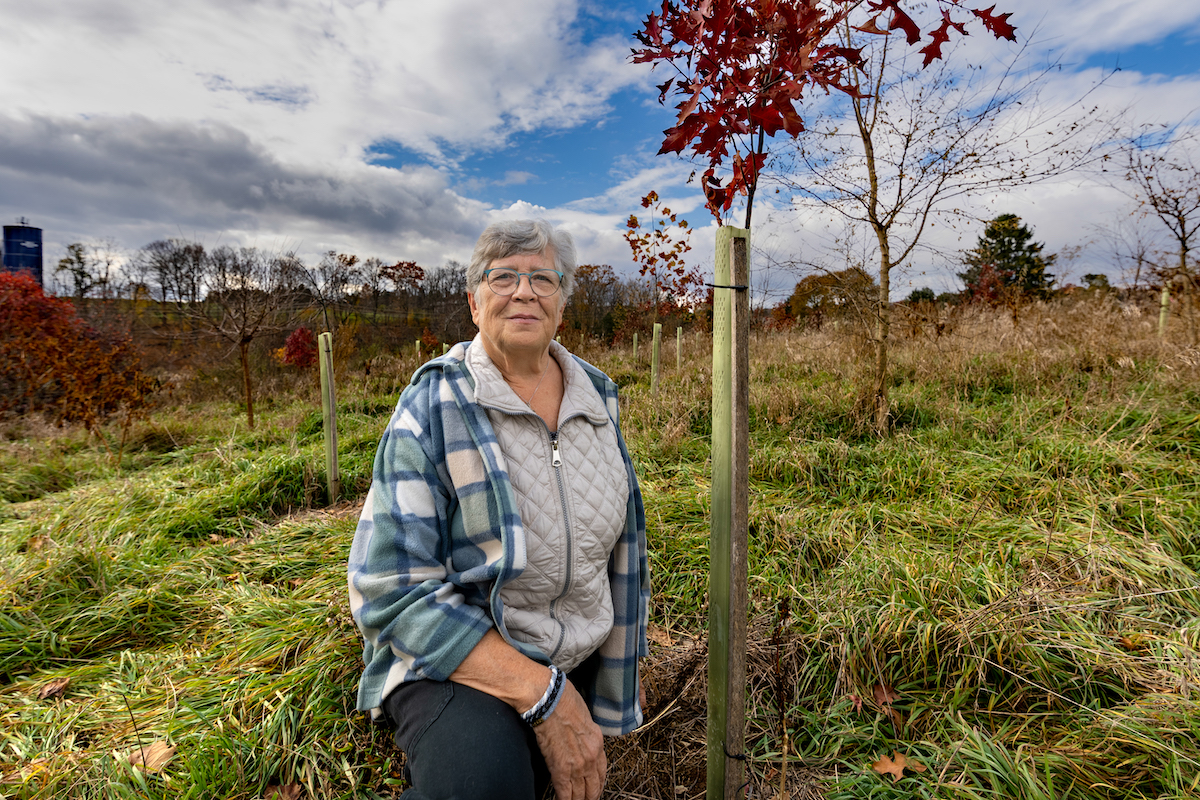Climate change. Hunger. Democracy. Social justice. War in Ukraine. All are huge issues that can seem overwhelming. How can one person possibly make a difference?
In Centre County, volunteers are stepping up to do their small part to change the world, starting close to home. Following are the stories of some of those dedicated individuals, representing the many, many members of our community who volunteer to make a difference, every single day, with these organizations and others.
Safeguarding the environment
There are nature lovers. And then there is Rosemarie Stover, who volunteers to protect the outdoor environment where she spends so much time hiking and kayaking. As a ClearWater Conservancy volunteer, she focuses on riparian buffers.
“Riparian buffers are the areas along streams in the county that are planted with trees so that the stream can really go back to its natural state. A lot of areas in Pennsylvania have been ‘logged off’ and the trees are taken away from the streams. This causes the streams to get warmer. So, a lot of the invertebrates and fish and things that live in the stream don’t survive as well as they do in the cold water,” Stover says.
She’s also involved with ClearWater’s Centred Outdoors program of public educational hikes, most of which take place in the summer.
So why ClearWater Conservancy?
“It’s very important because of the environment, especially in Pennsylvania. A lot of the areas in Pennsylvania are being developed, and our streams are very important because our water goes all the way to the Chesapeake Bay. If we’re sending nasty water out of Centre County, then the polluted water goes the whole way to the bay,” Stover explains.
Stover has been involved with ClearWater since 2020.
“I’ve always been concerned about it, but two years ago I became a Pennsylvania Master Naturalist. It was the first time in central Pennsylvania that the course was offered. It had been offered in Pennsylvania, but never in our area. I took the course and learned everything about geology, the plants, the animals, and everything within our county,” Stover says.
To earn the title of Pennsylvania Master Naturalist, she had to take ten classes—one night a week for ten weeks. She has been so active with ClearWater Conservancy since then that she was honored with her 250-hour service pin in November.
Fighting food insecurity
For John Dietz and his wife, Eileen, volunteering at the State College Food Bank has become a passion of sorts. He explains that the pair has been working there for five years.
“We do a variety of jobs there, but we primarily work with the clients when they come to pick the food up in the afternoons,” Dietz explains. “We work different shifts, but we’re very involved.”
According to Dietz, he and his wife started out by making small contributions to the Food Bank while they were still employed. Once they retired, they ramped up their involvement.
“We wanted to do something once we retired that would really give back to the community. We feel very strongly about people being able to have healthy and nutritious food and not worrying about where their next meal is going to come from. That was our driving motivation,” Dietz says.
The Food Bank does a wonderful job in trying to combat food insecurity, he says.
“I never thought, in an area like State College, that there were so many people struggling with food insecurity. It was kind of an eye-opener for me about 10 years ago, when I started caring about this,” Dietz says.

When he worked at Penn State, he saw students who were struggling with food insecurity.
“That’s when I first started realizing that there are a lot of people who just find themselves unable to afford food for themselves and their families.”
Food is fuel for the mind, body, and soul. Dietz says that if a person is hungry, everything else breaks down.
“If people are worried about how they’re going to feed themselves or their family, I don’t know how they can dedicate any time to building their path to a better life. It’s a basic necessity. That’s what has driven us,” Dietz says.
He and his wife have made many new friends while volunteering at the Food Bank.
“We really enjoy working with them, and it’s a social outlet of sorts,” Dietz says. “There’s more than 100 volunteers and we’ve met a bunch of them.”
Pre-COVID, volunteers would take the clients “shopping” and assist them in picking out their food. However, because of the pandemic, food is pre-packed in bags and delivered to clients at their vehicles. Dietz says that a lot of his time is spent as a “grocery assistant,” filling orders.
Dietz says that, ultimately, volunteering at the Food Bank gives him and his wife an opportunity to help their community, which they both love.
“There is a great deal of satisfaction that we derive from this volunteer work,” Dietz says. “When you take food out to a car, you see these little kids and you think, ‘These kids just need healthy food.’ Giving that food to them is very rewarding. That’s why we do what we do. It’s all about treating clients with dignity and respect.”
Encouraging democracy
With Election Day 2022 in the rearview mirror, Jan Koch can take a deep sigh of relief—but not for long.
Before she knows it, Koch, the president of the non-partisan League of Women Voters of Centre County, will be back at it, gearing up for the 2023 primary election.
Although she is a key cog in the operation, Koch refuses to take all the credit.
“It’s really not about me; it’s about all the volunteers we have,” she says. “I just happen to be a presiding officer right now.”
According to Koch, the League has 80-some members in Centre County, including 14 student members from Penn State.
The League of Women Voters plays a key role in the democratic process by producing the voter’s guide, with all candidates offered the opportunity to answer questions. Locally, the voter’s guide appears in The Centre County Gazette and the Centre Daily Times.
“In Pennsylvania, we have elections twice a year, so that means twice a year we are doing the voter’s guide,” Koch says.

The League of Women Voters also does a “candidate’s night” in the county. However, the League’s main mission, Koch says, is to get people registered to vote. “I feel that there’s nothing more important than exercising our right to vote,” she says.
“We try to make ourselves visible in the community, get out there and help people. We’re not only helping them register, but we’re answering all sorts of questions—about where their polling place is and any other questions they may have about voting,” Koch says.
All of the League’s positions are volunteer.
“We have no paid positions. We operate on a shoestring budget,” Koch says. “We rely on donations to keep us afloat.”
Advocating for social justice
Leslie Laing has an extensive resume in advocacy for social justice in the State College community, both as a volunteer and professionally. She is the student advocacy specialist and director of Adult Learner Programs and Services at Penn State and has served as past president of the Forum on Black Affairs, chair of three diversity conferences with the Community Diversity Group, a founding member of the Racial Unity Network between two local churches and host of Lunchbox Moments, which bring awareness to the Asian Pacific Islander Desi American experience.

“My passion for social justice stems way back to high school,” Laing explains. “I grew up in New York City and lived in a diverse community in the Bronx. Co-op City was predominantly a Jewish community, with clusters and pockets of Puerto Ricans, Dominicans, Haitians, [and] Jamaicans that all went to the same two middle schools that funneled into one high school. There was a sense of belonging despite our different issues. We worked alongside one another, spoke respectfully, shared resources, and found our solutions.”
Her unwavering faith, she says, led her down this path.
“Primarily, the seeds for service were rooted religiously in my faith-filled household. We were taught to be the hands and feet of Jesus. My involvement began and so continues in church, school, and community. I remember briefly being a Cadette in the Girl Scouts earning badges and getting a letter signed by Jimmy Carter, being involved in 4-H in Long Island, and learning about Dr. Martin Luther King, Jr. I later served as high school representative for the Commission on Education in Albany, where I got the honor of meeting Mr. Rogers, who championed children’s education and public broadcasting,” she recalls.
Laing urges everyone—especially people of color—to get involved.
“For most people of color, advocacy is a way of life. If we don’t speak up, and in some cases demand a seat at the table, our needs get overlooked,” Laing says. “Improving conditions, amplifying underrepresented voices becomes second nature and when we operate with [that] mindset, we make progress together.”
Laing is also a parent, volunteering with the local school district. She frequently volunteers and supports fundraising efforts for Out of the Cold, which benefits homeless community members in State College. She also serves on the joint Mental Health Taskforce and Progress Review for the borough and county.
Her passion for advocacy led her to join the Pennsylvania Prison Society, where she provided a Parenting Inside Out Program at Centre County Correctional Facility. Centre County Community Conferencing and Restorative Practice are additional areas of service. Laing’s notable activism on campus and in the community seeks to inspire and engage everyone in playing an active role in reforming policies and practices that impact residents daily.
“My central message is that everyone has a civic responsibility. You get to choose your level of engagement, the groups that represent what you value—shine a light on the issues that burn near and dear to your heart,” Laing says. “Everyone has a sphere of influence. Get involved—the health and well-being of our lovely community depends on everyone’s contribution. If you aren’t willing to be part of a solution, then you are part of the problem. Be the leader you would want to follow.”
Assisting Ukrainian refugees
The war in Ukraine is unfolding far away, but Jamison Malcolm and Maria Smereka-Hladio are among the local individuals who are making a difference for Ukrainian refugees through local groups.
The Centre Coalition for Ukraine comprises local business, education, medical, and mental health professionals who are working to raise funds and find community resources to assist refugees from war-torn Ukraine in temporarily relocating to the State College area. The group is working with the California-based nonprofit group Ukraine Now to identify Ukrainian refugees who recently moved to the United States and are in need of housing, food, medical care, and mental health resources.
“The Centre Coalition for Ukraine sprung up organically from work that myself and a few other local business leaders and academic types were doing,” says Jamison Malcolm, a Penn State doctoral student and UNESCO fellow.
He says the idea came from a monthly meeting called “Leadership on Tap,” which takes place at Happy Valley Brewery in State College.
“We decided as a group, collectively, that we live in an amazing community and if there was anything that we could do to help Ukrainian refugees who were getting here, that we wanted to do that,” he explains.
Malcolm says that although the Russia-Ukraine war has been pushed to the back of the newspaper and to the bottom of websites, people need to realize that the crisis still exists and is very real.
“The Ukrainian refugee crisis is the biggest crisis since World War II as far as population. Six million people have been displaced,” Malcolm says. “We decided we wanted to do something here locally, if we could.”
So how is the Centre Coalition for Ukraine making a difference, exactly?
“We’ve been a clearinghouse for people who want to volunteer and help local Ukrainian refugees who are already here. So that’s through English-as-second-language classes, helping people get acclimated culturally. We’ve partnered with the Penn State Ukranian Society … and we’re also working with relocating Ukrainian refugees here,” Malcolm says.
Funding for that comes from donations. On their first day collecting donations for the effort, they received a $10,000 pledge from the George Woskob family. Malcolm says the initiative has even received donations from three young children who each gave $1 from their personal allowances.
In mid-November, Malcolm was picking up a Ukrainian refugee couple. They would be housed at the guest home of one of the donors, he says. Acclimating to life in the United States is not easy for the Ukrainian refugees, but State College “is a really great place to land,” he says.
According to Malcolm, being part of the organization is incredibly rewarding—but that’s not why it was formed.
“I think we just see there is a huge need and there are a lot of folks in this community who want to step up and meet that need. We live in an amazing place with folks who are really concerned.”

Malcolm says organizations that have helped include The Pennsylvania Mental Health Initiative, Ukraine NOW, Nittany Church, the Woskob Family Foundation, State College Rotary and the Ukrainian Society of Penn State.
Maria Smereka-Hladio, an undergraduate student, is president of the Ukrainian Society on campus. The organization’s primary purpose is to engage its members in the active study of Ukrainian culture, literature, the arts, and current events in both Ukraine and the community of Ukrainians who live outside that country. The Penn State Ukrainian Society encourages the active participation of members not of Ukrainian descent and intends to foster cultural awareness among the university community. The Penn State Ukrainian Society assists recent immigrants and exchange students from Ukraine in assimilating and adjusting to American culture and society.
“We provide cultural and language support,” Smereka-Hladio explains. “As the Centre Coalition for Ukraine is focusing on relocating refugees to State College and providing them with resources, the cultural aspect of those resources is super, super important.”
For Smereka-Hladio, the cause is personal.
“I was born right after [my parents] immigrated here. I saw firsthand the difficulty of what it can be, moving to a new country,” she says. “There’s the emotional stress of having to leave your home country to find a safe place to live. That can be really overwhelming.”
According to Smereka-Hladio, Penn State’s Ukrainian Society is very active.
“We may be based on campus, but we’re pretty heavily involved in the community as a result of this effort,” says Smereka-Hladio, who has been impressed with the effort from her fellow students.
“People are passionate about doing this kind of work, especially those who are already involved in our organization. It can be difficult for students. We have a lot on our plates,” Smereka-Hladio says. Whether it’s students, faculty, or Centre County residents, everyone has stepped up, she says.
“It’s amazing how close-knit everyone is and how willing everyone is to help,” Smereka-Hladio says. “We have received an outpouring of love and support.” T&G
This story appears in the December 2022 issue of Town&Gown.



